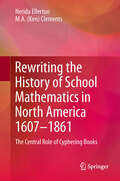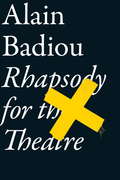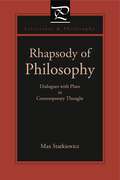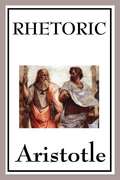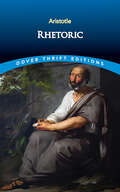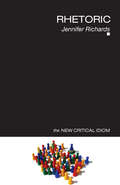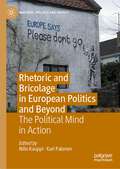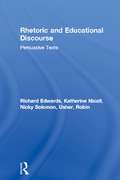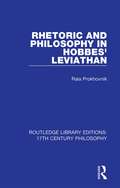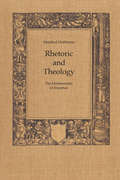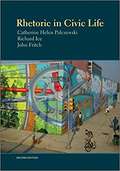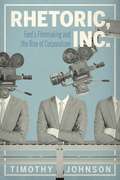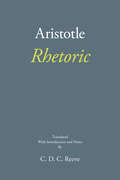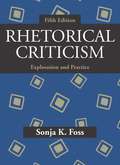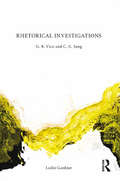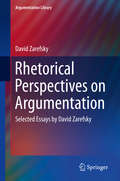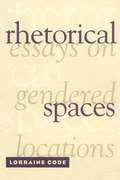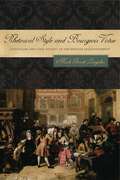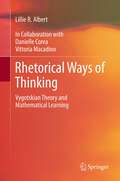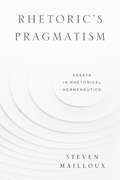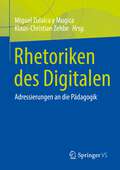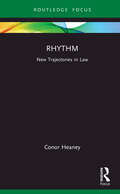- Table View
- List View
Rewriting the History of School Mathematics in North America 1607-1861
by M. A. Ken Clements Nerida EllertonThe focus of this book is the fundamental influence of the cyphering tradition on mathematics education in North American colleges, schools, and apprenticeship training classes between 1607 and 1861. It is the first book on the history of North American mathematics education to be written from that perspective. The principal data source is a set of 207 handwritten cyphering books that have never previously been subjected to careful historical analysis.
Rhapsody For The Theatre
by Bruno Bosteels Alain BadiouFor Alain Badiou, theatre--unlike cinema--is the place for the staging of a truly emancipatory collective subject. In this sense theatre is, of all the arts, the one strictly homologous to politics: both theatre and politics depend on a limited set of texts or statements, collectively enacted by a group of actors or militants, which put a limit on the excessive power of the state. This explains why the history of theatre has always been inseparable from a history of state repression and censorship.This definitive collection includes not only Badiou's pamphlet Rhapsody for the Theatre but also essays on Jean-Paul Sartre, on the political destiny of contemporary theatre, and on Badiou's own work as a playwright, as author of the Ahmed Tetralogy.
Rhapsody of Philosophy: Dialogues with Plato in Contemporary Thought (Literature and Philosophy)
by Max StatkiewiczThis book proposes to rethink the relationship between philosophy and literature through an engagement with Plato’s dialogues. The dialogues have been seen as the source of a long tradition that subordinates poetry to philosophy, but they may also be approached as a medium for understanding how to overcome this opposition. Paradoxically, Plato then becomes an ally in the attempt “to overturn Platonism,” which Gilles Deleuze famously defined as the task of modern philosophy. Max Statkiewicz identifies a “rhapsodic mode” initiated by Plato in the dialogues and pursued by many of his modern European commentators, including Nietzsche, Heidegger, Irigaray, Derrida, and Nancy. The book articulates this rhapsodic mode as a way of entering into true dialogue (dia-logos), which splits any univocal meaning and opens up a serious play of signification both within and between texts. This mode, he asserts, employs a reading of Plato that is distinguished from interpretations emphasizing the dialogues as a form of dogmatic treatise, as well as from the dramatic interpretations that have been explored in recent Plato scholarship—both of which take for granted the modern notion of the subject. Statkiewicz emphasizes the importance of the dialogic nature of the rhapsodic mode in the play of philosophy and poetry, of Platonic and modern thought—and, indeed, of seriousness and play. This highly original study of Plato explores the inherent possibilities of Platonic thought to rebound upon itself and engender further dialogues.
Rhetoric
by AristotleRhetoric is the counterpart of Dialectic. Both alike are concerned with such things that come, more or less, within the general ken of all men and belong to no definite science. Accordingly all men make use, more or less, of both; for, to a certain extent, all men attempt to discuss statements and to maintain them, to defend themselves, and to attack others. Ordinary people do this either at random or through practice and from acquired habit. Both ways being possible, the subject can plainly be handled systematically, for it is possible to inquire the reason why some speakers succeed through practice and others spontaneously; everyone will at once agree that such an inquiry is the function of an art.
Rhetoric (Dover Thrift Editions: Philosophy)
by AristotleOne of the seminal works of Western philosophy, Aristotle's Rhetoric vastly influenced all subsequent thought on the subject — philosophical, political, and literary. Focusing on the use of language as both a vehicle and a tool to shape persuasive argument, Aristotle delineates with remarkable insight both practical and aesthetic elements and their proper combination in an effective presentation, oral or written. He also emphasizes the role of language in achieving precision and clarity of thought.The ancients regarded rhetoric as the crowning intellectual discipline — the synthesis of logical principles and other knowledge attained from years of schooling. Modern readers will find considerable relevance in Aristotelian rhetoric and its focus on developing persuasive tools of argumentation. Aristotle's examinations of how to compose and interpret speeches offer significant insights into the language and style of contemporary communications, from advertisements to news reports and other media.
Rhetoric (The New Critical Idiom)
by Jennifer RichardsRhetoric has shaped our understanding of the nature of language and the purpose of literature for over two millennia. It is of crucial importance in understanding the development of literary history as well as elements of philosophy, politics and culture. The nature and practise of rhetoric was central to Classical, Renaissance and Enlightenment cultures and its relevance continues in our own postmodern world to inspire further debate.Examining both the practice and theory of this controversial concept, Jennifer Richards explores: historical and contemporary definitions of the term ‘rhetoric’ uses of rhetoric in literature, by authors such as William Shakespeare, Mary Shelley, William Wordsworth, Jane Austen, W.B. Yeats and James Joyce classical traditions of rhetoric, as seen in the work of Plato, Aristotle and Cicero the rebirth of rhetoric in the Renaissance and the Enlightenment the current status and future of rhetoric in literary and critical theory as envisaged by critics such as Kenneth Burke, Paul de Man and Jacques Derrida. This insightful volume offers an accessible account of this contentious yet unavoidable term, making this book invaluable reading for students of literature, philosophy and cultural studies.
Rhetoric and Bricolage in European Politics and Beyond: The Political Mind in Action (Rhetoric, Politics and Society)
by Kari Palonen Niilo KauppiThis book seeks to develop Rhetoric as a field of knowledge in an important new direction, European Union politics. The authors analyse what could be called a “European style of politics”: textual strategies and rhetorical styles evolving within and around the EU’s supranational and national institutions. By fusing rhetorical and sociological approaches, political thought and culture, the book contributes to the analysis of the ‘political’ as a way of thinking and judging the political aspect of any phenomena.
Rhetoric and Educational Discourse: Persuasive Texts
by Robin Usher Richard Edwards Katherine Nicoll Nicky SolomonEducational policy is often dismissed as simply rhetoric and a collection of half truths. However, this is to underestimate the power of rhetoric and the ways in which rhetorical strategies are integral to persuasive acts. Through a series of illustrative chapters, this book argues that rather than something to be dismissed, rhetorical analysis offers a rich and deep arena in which to explore and examine educational issues and practices. It adopts an original stance in relation to contemporary debates and will make a significant contribution to educational debates in elucidating and illustrating the pervasiveness of persuasive strategies in educational practices.Rhetoric and Educational Discourse is a useful resource for postgraduate and research students in education and applied linguistics. The book will also be of interest to academics and researchers in these fields of study and those interested in discursive approaches to research and scholarship.
Rhetoric and Philosophy in Hobbes' Leviathan (Routledge Library Editions: 17th Century Philosophy)
by Raia ProkhovnikOriginally published in 1991. This book explicitly examines rhetoric as the art of persuasion in the practical world, and as in the expression of thinking in the language a speaker uses. It presents Leviathan in terms of the philosophical character of the work considered through Hobbes’ use of language to express and organise his thought. Throughout, the nature of the relationship between rhetoric and philosophy is discussed and the problems of language in philosophical understanding. The book is concerned with Hobbes’ political philosophy and his views on figurative language, interest in literary theory and particularly his allegory. A special feature is the chapter on engraved title pages in Leviathan and other texts of the era.
Rhetoric and Theology: The Hermeneutic of Erasmus (The Royal Society of Canada Special Publications)
by Manfred HoffmanDeparting from the traditional focus on Erasmus as philologist and moralist, Rhetoric and Theology shows how Erasmus attempted to interpret Scripture by way of a rhetorical theology that focuses on the figurative, metaphorical quality of language, with a view to moral and theological reform. Manfred Hoffmann concentrates on the theological scources of Erasmus' hermeneutic from 1518 to 1535, especially the Ratio verae theologiae, the Ecclesiastes, and the exegesis of Old and New Testament texts. He shows that Erasmus' hermeneutic is based on the concept of language as mediation. Words do not have the power to represent the truth unambiguously, but they appeal to our understanding in ways that draw us to the truth through the process of interpretation. For Erasmus it is through allegory that the divine Word carries out its mediation between letter and spirit.Erasmus used the tools of rhetoric to read and understand Scripture, and thereby constructed a theological framework that has a direct relationship with his hermeneutic. Rhetorical theologians imitate the invention, disposition, inverbation, and delivery of divine speech by clarifying its composition, ordering its subject matter, internalizing its content, and communicating its transforming power of persuasion. Rhetoric provided Erasmus with the tools for finding theological loci in Scripture, drawing from it a repertoire for knowing and living, and translating it into sacred oratory.
Rhetoric in Civic Life (Second Edition)
by Catherine Helen Palczewski Richard Ice John FritchRhetoric in Civic Life provides a conceptually organized introduction to rhetorical theory and concepts. Sophisticated yet accessible, it guides students in exploring rhetorical action in a democratic society. <P><P>Thoroughly updated to reflect current theory, issues, and events, the new edition provides a rich array of historical and contemporary examples that show how words, images, arguments, and narratives create social and cultural identities and have consequences to civic life, public discourse and dissent, and social policies.
Rhetoric, Inc.: Ford’s Filmmaking and the Rise of Corporatism (RSA Series in Transdisciplinary Rhetoric #15)
by Timothy JohnsonIn 1914, the Ford Motor Company opened its Motion Picture Laboratory, an in-house operation that produced motion pictures to educate its workforce and promote its products. Just six years later, Ford films had found their way into schools and newsreels, travelogues, and even feature films in theaters across the country. By 1961, it is estimated that the company’s movies had captured an audience of sixty-four million people.This study of Ford’s corporate film program traces its growth and rise in prominence in corporate America. Drawing on nearly three hundred hours of material produced between 1914 and 1954, Timothy Johnson chronicles the history of Ford’s filmmaking campaign and analyzes selected films, visual and narrative techniques, and genres. He shows how what began as a narrow educational initiative grew into a global marketing strategy that presented a vision not just of Ford or corporate culture but of American life more broadly. In these films, Johnson uncovers a powerful rhetoric that Ford used to influence American labor, corporate style, production practices, road building, suburbanization, and consumer culture. The company’s early and continued success led other corporations to adopt similar programs.Persuasive and thoroughly researched, Rhetoric, Inc. documents the role that imagery and messaging played in the formation of the modern American corporation and provides a glimpse into the cultural turn to the economy as a source of entertainment, value, and meaning.
Rhetoric, Inc.: Ford’s Filmmaking and the Rise of Corporatism (RSA Series in Transdisciplinary Rhetoric #15)
by Timothy JohnsonIn 1914, the Ford Motor Company opened its Motion Picture Laboratory, an in-house operation that produced motion pictures to educate its workforce and promote its products. Just six years later, Ford films had found their way into schools and newsreels, travelogues, and even feature films in theaters across the country. It is estimated that by 1961, the company’s movies had captured an audience of sixty-four million people.This study of Ford’s corporate film program traces its growth and rise in prominence in corporate America. Drawing on nearly three hundred hours of material produced between 1914 and 1954, Timothy Johnson chronicles the history of Ford’s filmmaking campaign and analyzes selected films, visual and narrative techniques, and genres. He shows how what began as a narrow educational initiative grew into a global marketing strategy that presented a vision not just of Ford or corporate culture but of American life more broadly. In these films, Johnson uncovers a powerful rhetoric that Ford used to influence American labor, corporate style, production practices, road building, suburbanization, and consumer culture. The company’s early and continued success led other corporations to adopt similar programs.Persuasive and thoroughly researched, Rhetoric, Inc. documents the role that imagery and messaging played in the formation of the modern American corporation and provides a glimpse into the cultural turn to the economy as a source of entertainment, value, and meaning.
Rhetoric: Or, The True Grounds And Principles Of Oratory (The New Hackett Aristotle)
by Aristotle C. D. ReeveThis new translation of Aristotle's Rhetoric, noteworthy for its consistency and accuracy, is the latest addition to the New Hackett Aristotle series. Fitting seamlessly with the others in the series, it enables Anglophone readers to read Aristotle's works in a way previously impossible. Sequentially numbered endnotes provide the information most needed at each juncture, while a detailed Index of Terms guides the reader to places where focused discussion of key notions occurs.
Rhetorical Criticism: Exploration and Practice
by Sonja K. FossRhetorical criticism is an everyday activity we can use to understand our responses to symbols of all kinds and to create symbols of our own that generate the kinds of responses we intend. This book not only provides guidelines for understanding and practicing critical analysis but also conveys the excitement and fun that characterize the process.
Rhetorical Investigations: G. B. Vico and C. G. Jung
by Leslie GardnerRhetorical analysis of texts exposes plausible ‘truths’ and presumptions implied by the writer’s presentation. In this volume, Leslie Gardner analyses the master psychologist Jung, who claimed to be expert at uncovering personal, psychological truths. In his theoretical writings, his rhetoric reveals philosophical ramifications which bear strong similarities to those of the rhetorician of the 18th century, Italian philosopher Giambattista Vico. This book is driven by an interest in arguing that it is possible to read Jung’s works easily enough when you have a set of precepts to go by. The paradox of scientific discovery being set out in Jung’s grotesque and arcane imagery begins to seem a startling and legitimate psychology for the 21st century. It is time Jungian studies took on this most appropriate examination of analytical psychology. Bringing Vico to bear directly on Jung’s thought has only been cursorily attempted before although much alluded to. We find indeed that some of Jung’s ideas derive directly from rhetorical theory, and this volume proposes to highlight Jung’s innovations, and bring him into forefront of contemporary psychological thought. Rhetorical Investigations will be of interest to analysts and academics, and also to those studying philosophy and psychology.
Rhetorical Perspectives on Argumentation
by David ZarefskyThis book contains 20 essays tracing the work of David Zarefsky, a leading North American scholar of argumentation from a rhetorical perspective The essays cohere around 4 general themes: objectives for studying argumentation rhetorically, approaches to rhetorical study of argumentation, patterns and schemes of rhetorical argumentation, and case studies illustrating the potential of studying argumentation rhetorically These articles are drawn from across Zarefsky's 45-year career. Many of these articles originally appeared in publications that are difficult to access today, and this collection brings the reader up to date on the topic. Zarefsky's scholarship focuses on the role of language in political argumentation, the ways in which argumentation creates public knowledge and belief, the influence of framing and context on what is said and understood, the deployment of particular patterns and schemes of argumentation in public reasoning, and the influence of debate on politics and governance. All these topics are addressed in this book. Each of the conceptual essays includes brief application to specific cases, and five extended case studies are also presented in this volume. The case studies cover different themes: two explore famous political debates, the third focuses on presidential rhetoric across the course of United States history, the fourth on the arguments for liberalism at a time of political polarization, and the fifth on the contemporary effort to engage the United States with the Muslim world. This book is of interest to scholars in the fields of philosophy, logic, law, philosophy of law, and legal history. The range of topics and concepts addressed, the interplay of concepts and cases and the unifying perspective of rhetorical argumentation make this book a valuable read for students of argumentative practice, whether rhetorically or otherwise.
Rhetorical Spaces: Essays on Gendered Locations
by Lorraine CodeThe arguments in this book are informed at once by the moral-political implications of how knowledge is produced and circulated and by issues of gendered subjectivity. In their critical dimension, these lucid essays engage with the incapacity of the philosophical mainstream's dominant epistemologies to offer regulative principles that guide people in the epistemic projects that figure centrally in their lives. In its constructive dimension, Rhetorical Spaces focuses on developing productive, case-by-case analyses of knowing other people in situations where social-political inequalities create asymmetrical patterns of epistemic power and privilege.
Rhetorical Style and Bourgeois Virtue: Capitalism and Civil Society in the British Enlightenment (RSA Series in Transdisciplinary Rhetoric #2)
by Mark Garrett LongakerDuring the British Enlightenment, the correlation between effective communication and moral excellence was undisputed—so much so that rhetoric was taught as a means of instilling desirable values in students. In Rhetorical Style and Bourgeois Virtue, Mark Garrett Longaker explores the connections between rhetoric and ethics in the context of the history of capitalism. Longaker’s study lingers on four British intellectuals from the late seventeenth to the mid-nineteenth century: philosopher John Locke, political economist Adam Smith, rhetorical theorist Hugh Blair, and sociologist Herbert Spencer. Across one hundred and fifty years, these influential men sought to mold British students into good bourgeois citizens by teaching them the discursive habits of clarity, sincerity, moderation, and economy, all with one incontrovertible truth in mind: the free market requires virtuous participants in order to thrive. Through these four case studies—written as biographically focused yet socially attentive intellectual histories—Longaker portrays the British rhetorical tradition as beholden to the dual masters of ethics and economics, and he sheds new light on the deliberate intellectual engineering implicit in Enlightenment pedagogy.
Rhetorical Style and Bourgeois Virtue: Capitalism and Civil Society in the British Enlightenment (RSA Series in Transdisciplinary Rhetoric)
by Mark Garrett LongakerDuring the British Enlightenment, the correlation between effective communication and moral excellence was undisputed—so much so that rhetoric was taught as a means of instilling desirable values in students. In Rhetorical Style and Bourgeois Virtue, Mark Garrett Longaker explores the connections between rhetoric and ethics in the context of the history of capitalism. Longaker’s study lingers on four British intellectuals from the late seventeenth to the mid-nineteenth century: philosopher John Locke, political economist Adam Smith, rhetorical theorist Hugh Blair, and sociologist Herbert Spencer. Across one hundred and fifty years, these influential men sought to mold British students into good bourgeois citizens by teaching them the discursive habits of clarity, sincerity, moderation, and economy, all with one incontrovertible truth in mind: the free market requires virtuous participants in order to thrive. Through these four case studies—written as biographically focused yet socially attentive intellectual histories—Longaker portrays the British rhetorical tradition as beholden to the dual masters of ethics and economics, and he sheds new light on the deliberate intellectual engineering implicit in Enlightenment pedagogy.
Rhetorical Ways of Thinking
by Lillie R. Albert Danielle Corea Vittoria MacadinoRhetorical Ways of Thinking focuses on how the co-construction of learning models the interpretation of a mathematical situation. It is a comprehensive examination of the role of sociocultural-historical theory developed by Vygotsky. This book puts forward the supposition that the major assumptions of sociocultural-historic theory are essential to understanding the theory's application to mathematical pedagogy, which explores issues relevant to learning and teaching mathematics-in-context, thus providing a valuable practical tool for general mathematics education research. The most important goal, then, is to exemplify the merging of the theory with practice and the subsequent applications to mathematics teaching and learning. This monograph contains five chapters, including a primer to Vygotsky's sociocultural historic theory, three comprehensive empirical studies examining: prospective teachers' perception of mathematics teaching and learning and the practice of scaffolded instruction to assist practicing teachers in developing their understanding of pedagogical content knowledge. Finally, the book concludes with a contextualization of the theory, linking it to best practices in the classroom.
Rhetoric’s Pragmatism: Essays in Rhetorical Hermeneutics (RSA Series in Transdisciplinary Rhetoric #4)
by Steven MaillouxFor over thirty years, Steven Mailloux has championed and advanced the field of rhetorical hermeneutics, a historically and theoretically informed approach to textual interpretation. This volume collects fourteen of his most recent influential essays on the methodology, plus an interview.Following from the proposition that rhetorical hermeneutics uses rhetoric to practice theory by doing history, this book examines a diverse range of texts from literature, history, law, religion, and cultural studies. Through four sections, Mailloux explores the theoretical writings of Heidegger, Burke, and Rorty, among others; Jesuit educational treatises; and products of popular culture such as Azar Nafisi’s Reading Lolita in Tehran and Star Trek: The Next Generation. In doing so, he shows how rhetorical perspectives and pragmatist traditions work together as two mutually supportive modes of understanding, and he demonstrates how the combination of rhetoric and interpretation works both in theory and in practice. Theoretically, rhetorical hermeneutics can be understood as a form of neopragmatism. Practically, it focuses on the production, circulation, and reception of written and performed communication. A thought-provoking collection from a preeminent literary critic and rhetorician, Rhetoric’s Pragmatism assesses the practice and value of rhetorical hermeneutics today and the directions in which it might head. Scholars and students of rhetoric and communication studies, critical theory, literature, law, religion, and American studies will find Mailloux’s arguments enlightening and essential.
Rhetoric’s Pragmatism: Essays in Rhetorical Hermeneutics (RSA Series in Transdisciplinary Rhetoric)
by Steven MaillouxFor over thirty years, Steven Mailloux has championed and advanced the field of rhetorical hermeneutics, a historically and theoretically informed approach to textual interpretation. This volume collects fourteen of his most recent influential essays on the methodology, plus an interview.Following from the proposition that rhetorical hermeneutics uses rhetoric to practice theory by doing history, this book examines a diverse range of texts from literature, history, law, religion, and cultural studies. Through four sections, Mailloux explores the theoretical writings of Heidegger, Burke, and Rorty, among others; Jesuit educational treatises; and products of popular culture such as Azar Nafisi’s Reading Lolita in Tehran and Star Trek: The Next Generation. In doing so, he shows how rhetorical perspectives and pragmatist traditions work together as two mutually supportive modes of understanding, and he demonstrates how the combination of rhetoric and interpretation works both in theory and in practice. Theoretically, rhetorical hermeneutics can be understood as a form of neopragmatism. Practically, it focuses on the production, circulation, and reception of written and performed communication.A thought-provoking collection from a preeminent literary critic and rhetorician, Rhetoric’s Pragmatism assesses the practice and value of rhetorical hermeneutics today and the directions in which it might head. Scholars and students of rhetoric and communication studies, critical theory, literature, law, religion, and American studies will find Mailloux’s arguments enlightening and essential.
Rhetoriken des Digitalen: Adressierungen an die Pädagogik
by Klaus-Christian Zehbe Miguel Zulaica y MugicaDer Band nähert sich dem Thema ‚Digitalisierung’ problembeschreibend und sucht einen multiperspektivischen Zugang zu dem komplexen Forschungsfeld. Transformations- und Umbruchsrhetoriken bestimmen die Diskurse um Digitalisierung und formulieren immer politisch-gesellschaftliche Handlungsaufforderungen an Wissenschaft und Praxis. ‚Die Pädagogik‘ wird in diesem Feld als Vermittlerin adressiert, die Digitalisierung begleiten und mitgestalten soll. In den Beiträgen des Bandes wird der Frage nachgegangen wie eine reflektierte Perspektive zu diesen scheinbar alternativlosen Adressierungen gewonnen werden kann.
Rhythm: New Trajectories in Law (New Trajectories in Law)
by Conor HeaneyThis book analyses the conceptual and concrete relationships between rhythm and law. Rhythm is the unfolding of ordered and regulated movement. Law operates through the ordering and regulation of movement. Adopting a ‘rhythmanalytical’ perspective – which treats natural and social phenomena in terms of their rhythms, repetitions, motions, and movements – this book offers an account of how legal institutions and practices can be theorised and explained in terms of rhythm. It demonstrates how the category of rhythm has jurisprudential significance, from how Plato envisaged the functioning of the city-state, to the operation of the common law, as well as in our relationship to contemporary digital technology. In music, rhythm ‘orders’ the movement of sound, binding together the motions and vibrations of sound in such a way that is neither pure noise nor pure mechanics. In this way, rhythm can be deployed as a concept in the analysis of one of the central purposes of legal institutions and practices: to order the movements of bodies, whether the bodies of citizens in everyday life or of prisoners in rituals of punishment. This book engages with the mutual intersections and points of illumination between rhythm and law, such as ritual, measure, order, and change. This book is an experimental rhythmanalysis of law, offering conceptual and methodological starting points, as well as proposing directions that could be deployed in future research. It is aimed primarily at legal scholars intrigued by rhythmanalysis and rhythmanalysts more generally. This book will also be of interest to those in the fields of philosophy, political and legal theory, sociology, and other social sciences.
